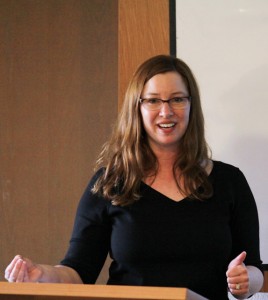Mignon Fogarty, the voice behind the popular “Grammar Girl” podcast and the author of “Grammar Girl’s Quick and Dirty Tips for Better Writing,” spoke Tuesday at an event sponsored by the Program in Writing and Rhetoric. Fogarty received her master’s in biology at Stanford –where she also wrote for The Daily — and had a career as a science writer before shifting her focus to syntax. Her podcasts seek to illuminate often-misunderstood grammar rules in five minutes or less, laying them out simply and clearly. The Daily’s Head Copy Editor Willa Brock ‘14 sat down with Fogarty to chat about pet peeves, punctuation and proper English.

The Stanford Daily (TSD): I send out “Copy Tip of the Week” emails to The Daily editors, and I’m always terrified that I’ll make an embarrassing mistake. You wrote a book about grammar — were you ever scared that you would have typos or grammar mistakes and people would be mean about it?
Mignon Fogarty (MF): Not so much when I was writing my books, because there are lots of rounds of editing, although errors have slipped through. But I do a weekly email newsletter…and there are typos that go out probably once every couple months. We get angry emails: “Shame on you!” People shaking their metaphorical fingers at us.
TSD: Do you have a biggest grammar pet peeve?
MF: I’m not a big peever, but when marketing people want to capitalize words that don’t need to be capitalized, that probably bothers me more than anything. There’s just no reason to capitalize, you know, “taco” in the middle of a sentence…It’s just a taco — capitalizing it doesn’t make it better.
TSD: Do you ever correct people in real life?
MF: No, never. I think it’s rude.
TSD: Do you have a favorite punctuation mark?
MF: I love the interrobang, which is a heretical punctuation mark created by an advertising man in the 1970s. You’re not supposed to end a sentence with a question mark and an exclamation point. You’re supposed to pick one, but sometimes you have a sentence that needs both: “He went to the store.” “Whaaaat?! He wasn’t supposed to!” It needs them both. And so there is this punctuation mark — it looks like a question mark and an exclamation point superimposed.
TSD: Do you ever use it?
MF: Sometimes I’ll use it when I tweet!
TSD: You were an English major as an undergraduate and then received a master’s in biology at Stanford… You’re both a techie and a fuzzy!
MF: After graduate school, I worked as a technical writer for a few years. It worked really well because there aren’t a lot of people who can understand the science deeply and also write really well, so I had plenty of work. It was great.
TSD: So how did “Grammar Girl” come about? What was the inspiration?
MF: It was my hobby, actually. I was doing the technical writing and technical editing, and I just saw scientists making the same mistakes over and over again…But it wasn’t my job to teach them. They weren’t interested in getting lessons…I was already podcasting — I was doing a science podcast — and I was looking for something else to do, and I thought, “Oh, I’ll just do little, five-minute grammar tips,” just as a hobby, and it took off like crazy.
TSD: And how long have you been doing it for?
MF: Almost six years.
TSD: How do you keep coming up with new things to talk about?
MF: Well, my goal now has been to do two reruns a month, but I’ve actually only been getting to about one rerun a month because there are so many interesting things still to talk about. It surprises me that there are still topics to cover, but there are…We talked this week about what it means for something to be “proper” English — the better term is really “standard” English. So we’re getting into a little bit more philosophical questions, but they’re fascinating and relevant to everyday writing.
TSD: On the subject of philosophy, do you have a specific approach to grammar? Why do you think it’s important to write correctly?
MF: It’s important to write correctly because people do judge you based on how you write, especially now that we aren’t meeting people face to face nearly as much as we used to. I’ve hired people without ever meeting them, based on email exchanges and their blog and things like that, so how you present yourself in writing is a really important part of your professional persona.
TSD: Is there a story behind your “quick and dirty” tagline?
MF: Yes, actually there is! Occasionally we get complaints from schools, saying, “We can’t send our students to something that has ‘dirty’ in the title.” And early on, people joked that I was educating one errant porn seeker at a time, but actually, it’s a more common phrase in Seattle, where I grew up. My mom used to use it — “quick and dirty” just means sort of fast and easy…You know, she’d say, “Let’s do a quick and dirty job on these dishes tonight.” When I started, I wanted the podcast to be short, quick tips. Nobody wants a half an hour grammar lesson; they want it in five minutes.
TSD: But now college students with dirty minds get all excited…
MF: I know, I know! I still get comments on my Facebook page like, “What’s dirty about this? I don’t get it!”
TSD: Are you going to be worried or angry if there are any mistakes in this article when we publish it?
MF: No, but you should be! There have been people who have written about me, and there have been grammar errors in the article, and they get lots of angry mail. So be careful, for your own sake. But I won’t be mad.
— Willa Brock